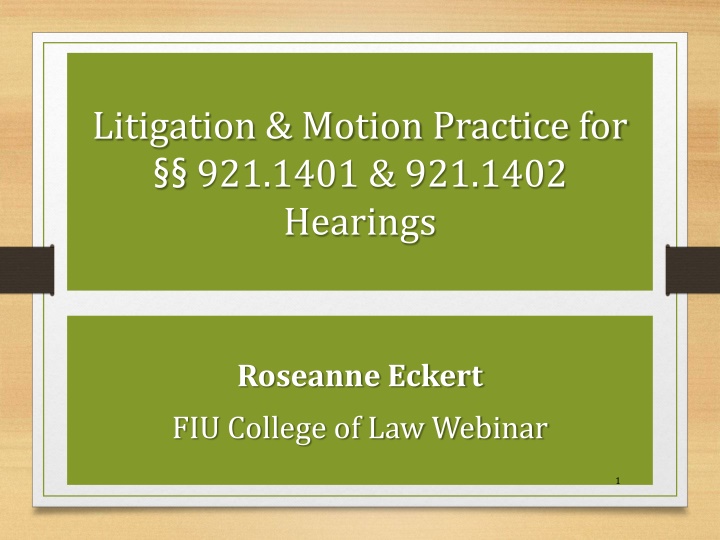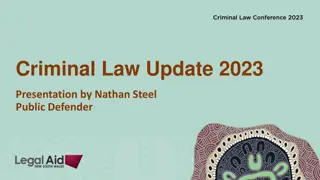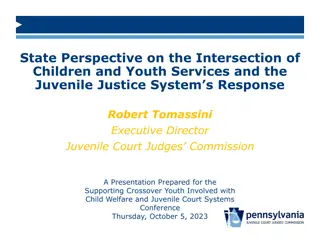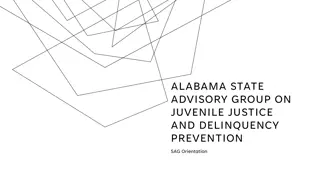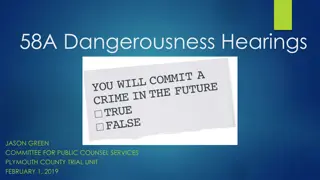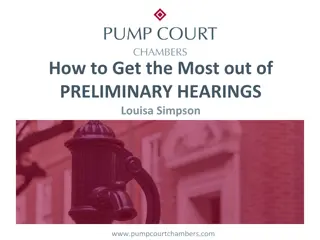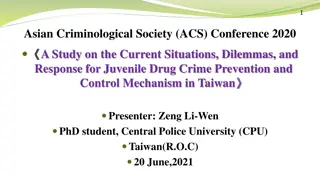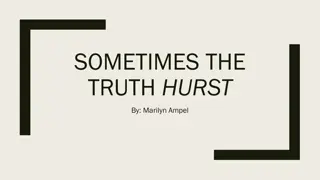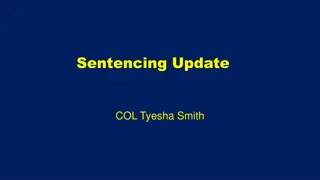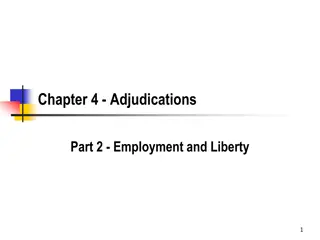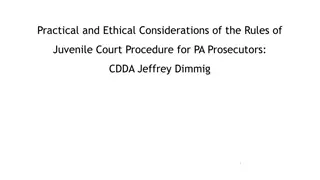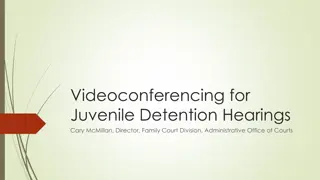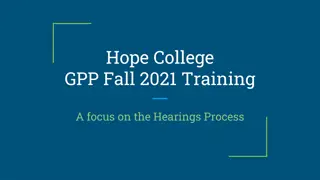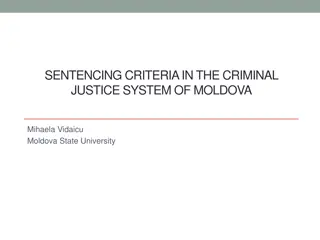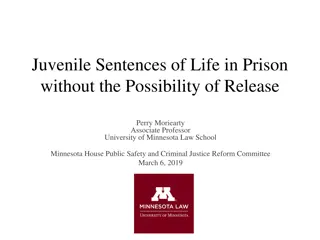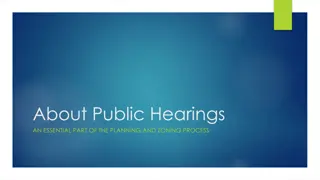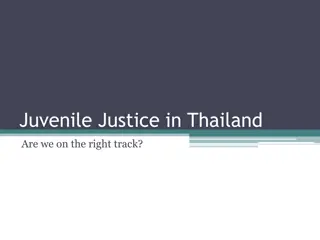Juvenile Sentencing Hearings and Legislative Responses: Legal Overview
Explore key cases like Roper v. Simmons, Graham v. Florida, and Miller v. Alabama that shaped juvenile sentencing laws. Delve into legislative responses like Chap. 2014-220, Laws of Florida, focusing on individualized hearings and factors considered in sentencing. Discover the impact on juvenile offenders' futures post-conviction.
Download Presentation

Please find below an Image/Link to download the presentation.
The content on the website is provided AS IS for your information and personal use only. It may not be sold, licensed, or shared on other websites without obtaining consent from the author.If you encounter any issues during the download, it is possible that the publisher has removed the file from their server.
You are allowed to download the files provided on this website for personal or commercial use, subject to the condition that they are used lawfully. All files are the property of their respective owners.
The content on the website is provided AS IS for your information and personal use only. It may not be sold, licensed, or shared on other websites without obtaining consent from the author.
E N D
Presentation Transcript
Litigation & Motion Practice for 921.1401 & 921.1402 Hearings Roseanne Eckert FIU College of Law Webinar 1
Roper v. Simmons (2005) Death Penalty Immaturity and Impetuosity Lack of Choice in Environment Capacity for Change 2
Graham v. Florida (2010) Non-Homicide Incorrigibility is inconsistent with youth. State must provide meaningful opportunity for release. Your client can still get life for non- homicide, but with opportunity for judicial review. 3
Miller v. Alabama (2012) Homicide The Court recognized that the distinctive traits of children are not crime specific. The State s most severe penalties on juvenile offenders cannot proceed as though they were not children. 4
LEGISLATIVE RESPONSE TO MILLER Chap. 2014-220, Laws of Florida, codified at 941.1401, 941.1402, and 775.082 (2014). 5
LEGISLATIVE RESPONSE TO MILLER New and different penalties for juveniles convicted as adults. Factors to be considered at individualized sentencing hearings when child convicted of a capital, life, or first-degree felony. Provides for subsequent judicial review of the sentence in most cases. 6
Individualized Hearings 921.1401 7
Individualized sentencing hearings. Crimes on or after July 1, 2014. The court may conduct a separate sentencing hearing to determine if a term of imprisonment for life or a term of years equal to life imprisonment is appropriate. 921.1401(1) Individualized Hearings Sentencing Factors 8
Circumstances of the offense; The effect on the victim's family & community; The extent of the child's participation; 921.1401(2) Individualized Hearings Sentencing Factors 9
Child's background; The effect of family pressure or peer pressure on the child; prior criminal history; 921.1401(2) Individualized Hearings/Sent encing Factors 10
Age, maturity, IQ, mental health at the time of the offense; Effects of immaturity & impetuosity, etc., on the child's participation in the offense; 921.1401(2) Individualized Hearings Sentencing Factors The effect of characteristics of youth on the child's judgment; 11
921.1401(2) The possibility of rehabilitating the child. Individualized Hearings Sentencing Factors 12
Requires examination of any presentence reports. Requires written order when imposing a life sentence or a term of years equal to life. Requires written finding as to judicial review. Fla. R. Crim. P. 3.781 Governs proceedings for juvenile sentencing hearings. 13
Sentencing Options 775.082 14
Juvenile who actually killed, intended to kill, or attempted to kill the victim shall be sentenced to life, if appropriate. Sentence must be at least 40 years. Judicial review in 25. Sentencing & Judicial Review Eligibility 775.082(1)(b)(1) - capital or reclassified as capital felony 15
Sentencing & Judicial Review Eligibility If the juvenile did not actually kill, intend to kill, or attempt to kill the victim, he or she may be sentenced to life or by a term of years equal to life if appropriate. 775.082(1)(b)(2) capital or reclassified as capital; Judicial review in 15 years. But, convicted of felony murder. 16
A juvenile . . .may be sentenced to life or a term of years equal to life if appropriate. Whether the juvenile is entitled to judicial review in 25 years or 15 years is dependent upon finding as to actually, intended, or attempted to kill the victim. Sentencing & Judicial Review Eligibility 775.082(3)(a)(5) - convicted under 782.04 of offense reclassified as a life felony (2nd Degree Murder) 17
Sentencing & Judicial Review Eligibility A juvenile convicted under 782.04 of a first degree felony punishable by life or an offense reclassified as a first degree felony punishable by life may be sentenced to a term of years equal to life if the court finds it is an appropriate sentence. 775.082(3)(b) 2 1st Degree PBL Felony (or reclassified as such) Again, whether the juvenile convicted of murder is entitled to judicial review in 25 years or 15 years is dependent finding on whether he actually, intended, or attempted to kill the victim. 18
Juvenile may be sentenced to life or a term of years equal to life, if appropriate. Judicial review in 20 years with subsequent review in 10 years. Sentencing & Judicial Review Eligibility 775.082(3)c non-homicide Graham cases: Offenses PBL or reclassified as such. 19
Judicial Review 921.1402 20
Judicial Review Onus on inmate to file application. DOC must notify the juvenile of eligibility 18 months beforehand. Right to counsel. 21
May not apply until eligible. Include copy of J&S or statement with date of sentence, offense, and sentence imposed; Nature of relief sought; History on prior applications; Statement of facts in support of modification. Fla. R. Crim. P. 3.802 Governs procedures for Judicial Review 22
Was juvenile a relatively minor participant or under extreme duress; Judicial Review Factors 921.1402(6) Whether juvenile s age, maturity or psychological development affected behavior; 23
Whether the juvenile was a victim of sexual, physical or emotional abuse before the offense; Results of any mental heath assessment, risk assessment, or evaluation as to rehabilitation; Judicial Review Factors 921.1402(6) 24
Whether the juvenile has shown sincere & sustained remorse; Judicial Review Factors 921.1402(6) Whether the juvenile has obtained GED or completed other available programs; 25
Whether juvenile remains at the same level of risk as he or she did at initial sentencing; Whether the juvenile demonstrates maturity and rehabilitation; and The opinion of the victim or the victim s next of kin. Judicial Review Factors 921.1402(6) 26
If the court finds the juvenile is rehabilitated & reasonably fit to renter society, the court shall modify the sentence & impose a term of probation of at least 5 years. Judicial Review 921.1402(7) 27
If the court finds the juvenile is not rehabilitated or fit to reenter society, the court shall issue a written order stating why the sentence is not being modified. Judicial Review 921.1402(7) 28
Juvenile who actually killed, intended to kill, or attempted to kill who is convicted of a capital felony (or an offense that was reclassified as a capital felony) is not entitled to judicial review if he or she has been previously convicted of certain enumerated felony offenses. Judicial Review 921.1402(2)(a) Prior Enumerated Felony Exclusion 29
Murder; Manslaughter; Sexual battery; Armed burglary; Armed robbery; Armed carjacking; Home-invasion robbery; Human trafficking for commercial sexual activity with a child under 18 years of age; False imprisonment under s. 787.02(3)(a); or Kidnapping. Judicial Review 921.1402(2)(a) Prior Enumerated Felony Exclusion 30
Judicial Review In a pre-2014 resentencing, the appellate court remanded the case to the circuit court to include the right to judicial review. Matias v. State, No. 2D16-971, *2 (Fla. 2d DCA Oct. 11, 2017). The Criminal Rules Committee is considering a rule requiring a written finding on judicial review at the time of sentencing or resentencing. 31
Judicial Review Your client must apply for judicial review; there is nothing in the statute that would allow the court to force the defendant to have the review hearing and resentencing at the same time. Your client is not required to seek judicial review immediately upon becoming eligible. On a resentencing, you should ask the court to imposed the new sentence and the judicial review period nunc pro tunc to the original sentencing date, and include any credit for time served prior to the initial sentencing. 32
Case Law & Pending Issues 33
Retroactivity Postconviction 34
Retroactivity Horsley v. State, Falcon v. State, 160 So. 3d 393 (Fla. 2015) 162 So. 3d 954 (Fla. 2015) Retroactive under Witt (FL) and Teague (Fed.) Relief for over 250 juveniles serving LWOP Pipeline Case Resentencing pursuant to 921.1401. 35
Rule 3.850 Motion Florida Rule of Criminal Procedure 3.850 is the appropriate vehicle to obtain relief. The 3.850 motion must be verified by the client. The motion must be brought within two years of when the new case law became final; within one year to preserve federal remedies. 36
Rule 3.800 Motion You may file a motion to correct an illegal sentence pursuant to rule 3.800 if time is an issue or if you are unable to get the motion verified. A 3.800 motion is appropriate where the illegality and unconstitutional nature of the sentence may be deduced from the face of the record without the need for an evidentiary hearing. Landy v. State, 205 So. 3d 801 (Fla 2d DCA 2016). 37
Montgomery v. Louisiana USSC Miller s prohibition against mandatory life without parole sentences for juveniles is a substantive rule and therefore, retroactive under federal law. 136 S.Ct. 718 (2016). 38
Atwell and Landrum The spirit of Miller 39
Landrum v. State 2nd Degree Murder Laisha Landrum & her boyfriend beat another girl with a hammer, then left her close to death in a trash bin. Miller is about how children are different and not about the mandatory nature of the sentence imposed. 192 So. 3d 459 (Fla. 2016) 40
Landrum v. State Why should she receive such an uncommon and exceedingly rare life sentence, rather than a 22.3 year guideline sentence, or. . . one that departed downward. . . [?] Landrum. 41
Atwell v. State Life With Parole Eligible for resentencing on life with Parole for murder before May 25, 1994. 197 So. 3d 1040 (Fla. 2016). FSC followed the spirit of Miller. Parole system & FCOR do not consider characteristics of youth. 42
Atwell Applies to Graham cases Burney v. State, 211 So. 3d 1106 (Fla. 2d DCA 2017) -Juvenile sentence to life with parole for burglary gets new sentencing. Marshall v. State, 214 So. 3d 776(Fla. 2d DCA 2017) 99 year concurrent sentences for non- homicide crimes unconstitutional. Parole abolished for non-homicide crimes on October 1, 1983. 43
Atwell: Presumptive Parole Release Date (PPRD) The Fifth remanded a case for a hearing to determine PPRD & whether he is entitled to a resentencing. Stallings v. State, 204 So. 3d 101 (Fla. 5th DCA 2016 The Fourth Florida s parole system does not provide the individualized sentencing consideration required by Miller. Michel v. State, 204 So. 3d 101 (Fla. 4th DCA 2016). Certified Conflict Pending SC16-2187 44
Atwell: Sentenced to Death for a 1960 Felony Murder Calvin Thomas 45
Atwell: Prior Parole Violations Calvin Thomas 46
Atwell: Prior Parole Violations 2017 Cases No resentencing where the child has previously been paroled and re- incarcerated on parole violation. Currie v. State, 219 So. 3d 960 (Fla. 1st DCA 2017) Rogers v. State, 223 So. 3d 281 (Fla. 4th DCA 2017) Rooks v. State, 224 So. 3d 272 (Fla. 3rd DCA 2017): Jurisdictional brief pending in SC17-1342. 47
Lengthy Prison Sentences De Facto Life or Meaningful Opportunity for Release? 48
De Facto Life Sentences in Graham Cases Henry v. State, 175 So. 3d 675 (2015). Aggregate sentence of 90 years is unconstitutional. Resentencing pursuant to 921.1401. Gridine v. State, 175 So. 3d 672 (Fla. 2015). 70 years is unconstitutional. Resentencing pursuant to 921.1401. 49
Peterson Certified Questions Is Henry retroactive? Does Henry only apply to de facto life sentences? When is a term-of-years sentence de facto life? Should gender, race, SES, & gain time be considered? 50
